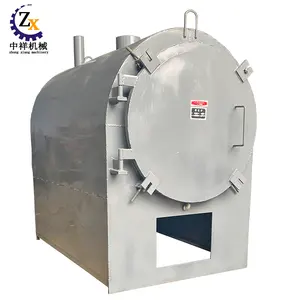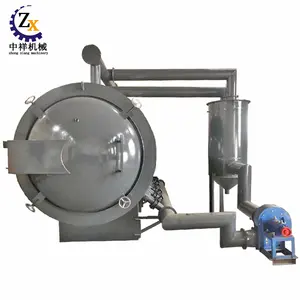(52 products available)
















































































































































































A briquette press for UK is a machinery that compresses materials such as wood chips, straws, rice husks, peanut shells, and other biomass into briquettes or bio-coal. The machine is used to produce fuel for boilers, cookstoves, and other applications. The machine comes in a variety of designs and operating principles.
It is commonly used in the industrial setting, where high production is required. The machine has a large screw that compresses the raw material through a heated chamber. As the material passes through the chamber, the pressure and temperature increase, which causes the material to release lignin. Lignin acts as a natural binding agent that holds the briquette together. Once the material is heated and the pressure is high, it is forced through the die and comes out in uniform briquette shapes. The mechanical press requires constant supervision and adjustment to control the moisture content of the material and ensure that the briquette produced is of high quality.
The hydraulic briquette press for sale in the UK has a small volume and is used for individual or small-scale operations. The machine is operated by hydraulic systems that apply high pressure to compress the material into briquettes. The machine operates at a stable temperature and pressure, which makes it suitable for various materials. It is also easy to operate and requires minimal maintenance. However, the hydraulic briquette press has a low output and is not suitable for high production.
The screw propeller press is also known as a screw briquette machine. It is widely used in both industrial and domestic settings to produce biomass briquettes. The machine works by extruding the raw material through a die. The screw is made of high-quality alloy steel, and it is treated to increase its durability. The screw pushes the raw material forward and compresses it in the die head. The machine is versatile and can be used to produce various shapes and sizes of briquettes. It is also easy to operate and maintain.
The piston press has a compact design and occupies less space. It uses friction and pressure to compress the raw material into briquettes. The machine is used in small-scale production, and it can be operated manually or automatically. It works well with materials that have low moisture content. However, the piston press machine produces low-density briquettes compared to other types of briquette press machines.
Specifications of briquette presses vary depending on type, model, and manufacturer. The following are some key specifications that are important to consider when purchasing a briquette press for UK.
Proper maintenance of the briquette press helps to guarantee optimal performance and extends its lifespan. Regularly clean the machine to remove residue and prevent blockages. Also, inspect and replace the wear parts such as the screws, liners, and die, to maintain efficiency and quality of the briquette production. Lubricate moving parts to reduce friction and prevent wear. Also, inspect the electrical components of the machine and ensure there are no loose connections. Finally, develop a regular maintenance schedule to help in keeping the machine in optimal condition.
A UK business buyer may want to import a briquette press machine for charcoal from overseas for resale. The machine has many application areas in the UK market.
The machine can compress non-metallic materials like plastic, paper, and glass into briquettes. These materials are usually difficult to dispose of and may require a landfill. With the briquette press machine, the materials are compressed into small briquettes that can be recycled. The recycling companies can sell the briquettes to other processing businesses, creating a sustainable material cycle.
The hydraulic briquette press machine can be used to compress biomass materials like wood chips, sawdust, and agricultural residue into briquettes. The machine is used to reduce the materials into clean energy sources like biomass waste, wood, or charcoal briquettes. Using the briquette press machine, biomass companies can provide a cheap alternative to fossil fuels.
In the automotive sector, the briquette press machine can be used to compress metal chips and waste into briquettes. The compressed briquettes can either be used as raw materials for other manufacturing industries or disposed of. Using the briquette press machine, automotive companies can reduce waste and earn extra income when they sell the compressed briquettes to recycling companies.
The briquette press machine can be used to compress coal dust into coal briquettes. The coal briquettes can be used by energy companies as a cheap source of energy. With the briquette press machine, the companies can save costs and produce energy efficiently.
Chemical companies can use the briquette press machine to compress chemical fertilizers and other products into briquettes. The machine can also be used to compress moisture-sensitive powders into solid briquettes for easier handling and transport.
Food processing companies can use the briquette press machine to compress food waste into briquettes. The briquettes can be recycled as animal feed or fertilizers. With the briquette press machine, the food processing companies can dispose of food waste in an environmentally friendly manner.
The briquette press machine can be used by contract manufacturing companies to compress their clients' products into briquettes. The products may include machinery parts, components, and other materials. The compressed briquettes are easier to handle, transport, and store.
When selecting a suitable briquette press machine, it is important to consider the following key factors so that it can meet the specific needs and requirements of the UK customers.
It is important to determine the required output capacity of the briquette press machine. This is based on the estimated volume of briquettes that will be produced on a daily, monthly, or yearly basis. The required output capacity will vary depending on factors such as production scale, customer demand, and available resources.
It is crucial to ensure that the selected briquette press machine is compatible with the materials that will be used for briquette production. Different types of briquette presses are designed to handle specific types of raw materials, such as wood, biomass, coal, charcoal, and metal. Investing in a machine that is specifically designed for the intended materials will help optimize the briquette production process and ensure consistent quality.
Briquette press machines are available in various power sources, including electric, hydraulic, and diesel-powered. Each power source has its unique advantages and suitability for different applications. Consider the energy source options and choose a briquette press machine that aligns with the available power sources and operational requirements.
Some briquette press machines offer fully automated operation, while others have manual or semi-automatic controls. The automation level of the machine will impact operational efficiency, labor requirements, and consistency in briquette quality. Depending on specific needs and priorities, choose a machine with an appropriate level of automation that suits the production volume and skill level of operators.
It is essential to select a briquette press machine that offers a high level of durability and reliability under the demanding production environment in the UK. Consider the build quality, materials, and construction of the machine to ensure it can withstand continuous use and maintain performance over time with proper maintenance.
Q1: What are the different types of briquette machines?
A1: The most common types are mechanical and hydraulic presses. Some machines use mixed energy. Other less common types include screw extruders, heated dies, and roller presses.
Q2: What are the briquettes made of?
A2: Biomass briquettes can be made from various organic materials, such as agricultural residues, forest residues, energy crops, and animal manure. They are usually dried and compressed under high pressure without using chemical binders.
Q3: What are the benefits of using a briquette press?
A3: The briquette press offers numerous benefits. It can reduce waste volume, lower transportation costs, and create a new revenue stream by selling the briquettes. It can also reduce the need for landfilling, providing an eco-friendly waste disposal solution.
Q4: What is the moisture content of raw materials for briquette presses?
A4: The ideal moisture content varies depending on the type of raw material and the briquette press used, but in general, the moisture content of raw materials for briquette presses should be between 8% and 15%. If the moisture content is too low, it can affect the binding and compaction of the briquettes, while if it is too high, it can lead to poor-quality briquettes and difficulties in the briquetting process.